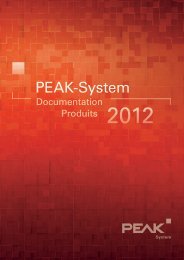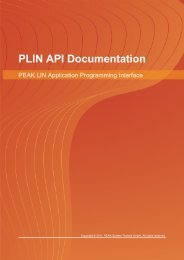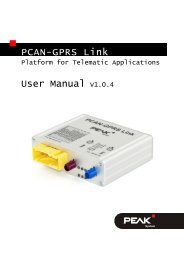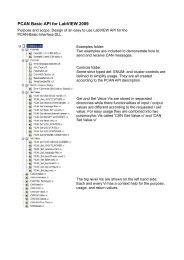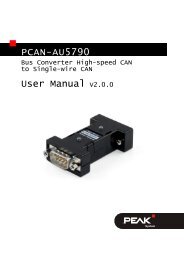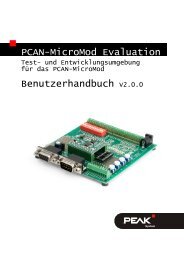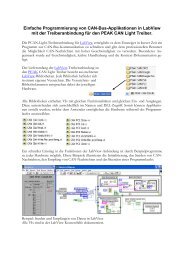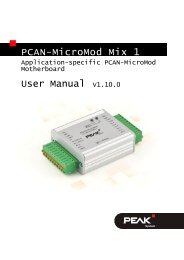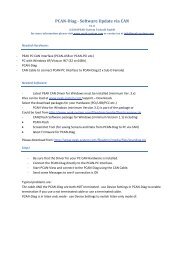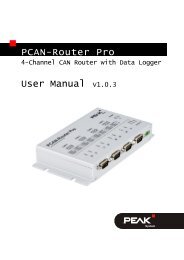PCAN-driver for Linux - PEAK-System
PCAN-driver for Linux - PEAK-System
PCAN-driver for Linux - PEAK-System
You also want an ePaper? Increase the reach of your titles
YUMPU automatically turns print PDFs into web optimized ePapers that Google loves.
The <strong>driver</strong> is configured <strong>for</strong> the dynamic allocation of the „major“ serial number (4*).<br />
This is why the device files have to be generated newly every time after <strong>driver</strong><br />
installation. Please invoke the shell script <strong>for</strong> this:<br />
./pcan_make_devices 2<br />
This script installs two device files <strong>for</strong> each PCI, ISA, Dongle Devices in SP and EPP<br />
mode (3*) and USB-devices. Please verify the result with the command:<br />
ls -l /dev/pcan*<br />
Now you already can do your first test with your CAN hardware. Just connect a CANtransmitter<br />
to your CAN interface and send telegrams with bit rate setting of 500<br />
kbit/sec . Login at a user-console and invoke:<br />
cat /dev/pcan0 <strong>for</strong> the first <strong>PCAN</strong>-PCI interface<br />
cat /dev/pcan8 <strong>for</strong> the first <strong>PCAN</strong>-ISA or <strong>PCAN</strong>-PC/104 interface<br />
cat /dev/pcan16 <strong>for</strong> the first <strong>PCAN</strong>-Dongle interface in SP-mode<br />
cat /dev/pcan24 <strong>for</strong> the first <strong>PCAN</strong>-Dongle interface in EPP-mode<br />
cat /dev/pcan32 <strong>for</strong> the first <strong>PCAN</strong>-USB interface (*9)<br />
cat /dev/pcan40 <strong>for</strong> the first <strong>PCAN</strong>-PC Card interface<br />
The received telegrams should be shown (5*). This invocation can be made at more<br />
than one console <strong>for</strong> more than one interface at the same time.<br />
The output of data is already possible. With the call of:<br />
echo „m s 0x234 2 0x11 0x22“ > /dev/pcan0<br />
<strong>for</strong> example a CAN telegram with standard frame is transmitted with the identifier<br />
0x234 and two data bytes „0x11“ and „0x22“ from the first <strong>PCAN</strong>-PCI interface. The bit<br />
rate of the interface can as well be set from the so called „write interface“.<br />
Manual installation of the shared library<br />
Please change to the directory „../peak-linux-<strong>driver</strong>-x.y/lib“. Login as „root“ user and<br />
invoke:<br />
cp libpcan.so.0.1 /usr/lib/libpcan.so.0.1<br />
ln -sf /usr/lib/libpcan.so.0.1 /usr/lib/libpcan.so.0<br />
ln -sf /usr/lib/libpcan.so.0 /usr/lib/libpcan.so<br />
This process is only necessary if you install this program <strong>for</strong> the first time or if you want<br />
to update the library. To use the test programs the library has to be installed.<br />
Manual installation of the header-files<br />
Please copy the header-files into the directory „/usr/include“ as “root” user as followed<br />
and customize the access rights.<br />
cp peak-linux-<strong>driver</strong>/<strong>driver</strong>/pcan.h /usr/include/pcan.h<br />
chmod 644 /usr/include/pcan.h<br />
cp peak-linux-<strong>driver</strong>/lib/libpcan.h /usr/include/libpcan.h<br />
chmod 644 /usr/include/libpcan.h<br />
<strong>PCAN</strong>-<strong>driver</strong> <strong>for</strong> <strong>Linux</strong> page 10 of 23



![English - Low Quality [7.2 MB] - PEAK-System](https://img.yumpu.com/5931738/1/184x260/english-low-quality-72-mb-peak-system.jpg?quality=85)
